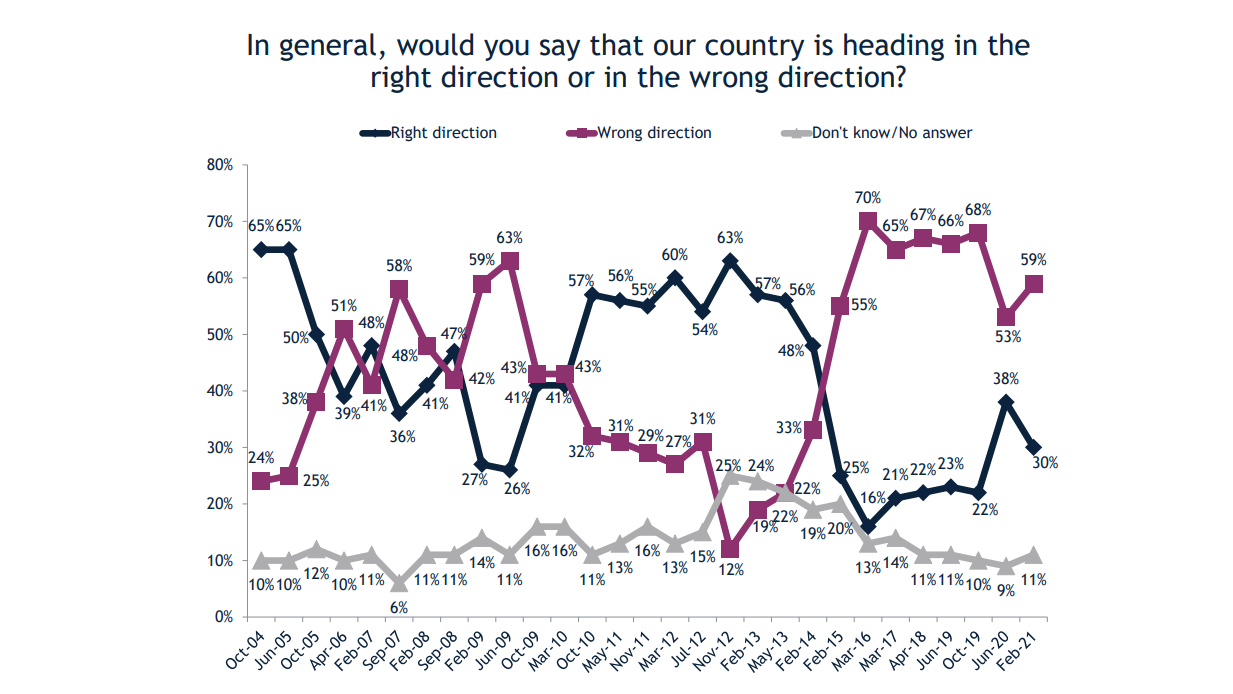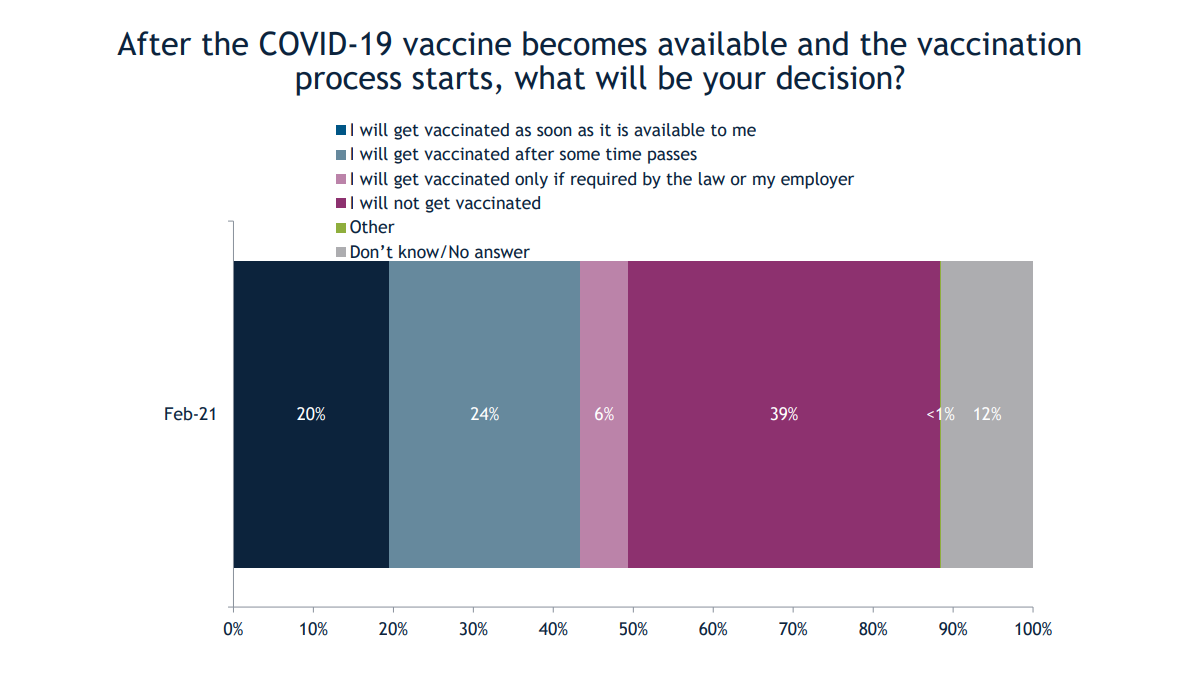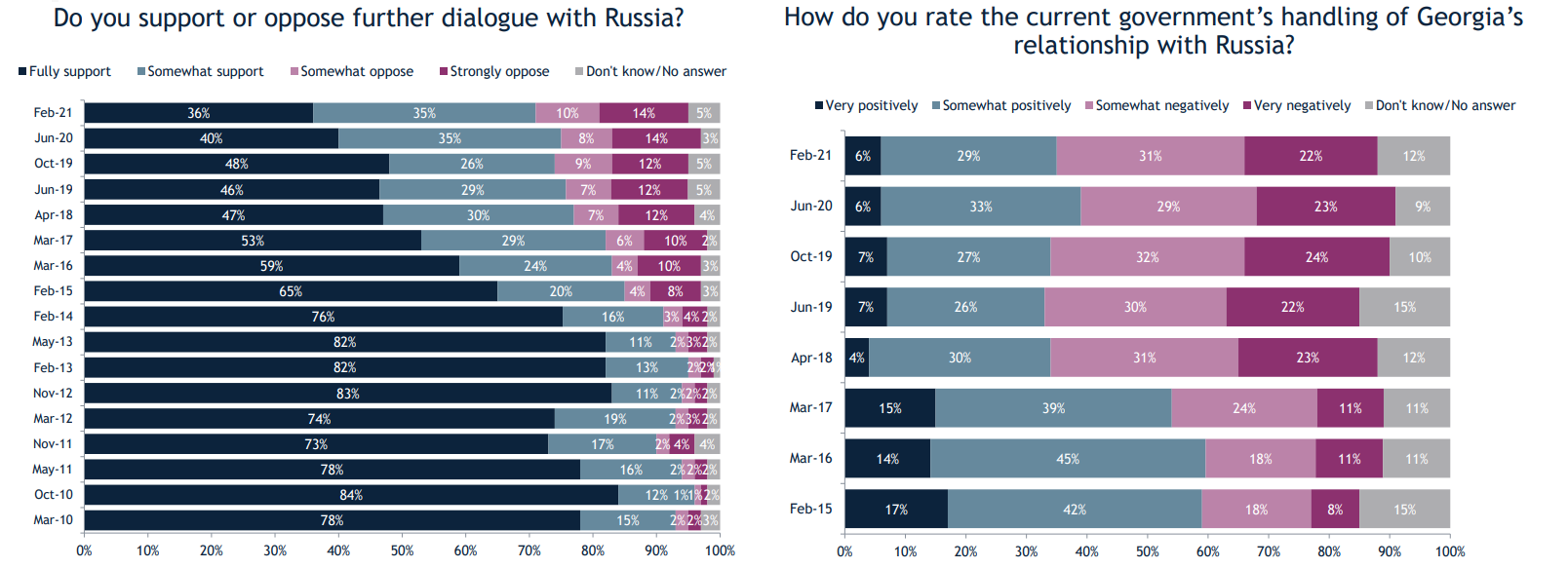
IRI Poll Shows Public Split on Snap Elections, Concerned with Economy
A new public opinion poll, commissioned by the International Republican Institute and released on April 5, reveals that the Georgian public is split on the issue of snap elections, disapproving the opposition’s decision to boycott the new Parliament and concerned with the economy.
Reckoning the country’s direction, 59% of the respondents said Georgia is going in the wrong direction (up from 53% in June 2020), while 30% said it goes in the right direction (down from 38% in June).

Snap elections, opposition boycott
The Georgian public is split 45% on 45% on the issue of holding snap parliamentary elections. Only 25% of the respondents support the opposition’s demand for snap elections “definitely,” while 20% support it “somewhat.” 12% answered “somewhat no,” while 33% said “definitely no.” 9% of respondents did not know.
In regards to the opposition’s decision to boycott the new Parliament, only 26% support the decision, while 60% do not. 14% said they did not know the answer.
Of those who support the boycott, 44% either did not answer or did not know why they do. The United National Movement and Strategy Aghmashenebeli supporters are more likely to “definitely” support the boycott, with 46% and 27% respectively.
Public figures, institutions
Georgian Orthodox Church Patriarch Ilia ll retained his place as the most favorably viewed public figure, with 89% favorability, while former PM Giorgi Gakharia followed second with 65% (resigned on February 18, during the fieldwork period). 54% of the respondents viewed Tbilisi Mayor Kakha Kaladze favorably, 52% – European Georgia’s David Bakradze and 42% – UNM chairperson Nika Melia.

Meanwhile, the most unfavorably viewed politicians are Nino Burjanadze (69%), Irma Inashvili (65%) and Zurab Girchi Japaridze (65%).
Army and the Church top the list as most favorably viewed institutions with 82% and 79%. Georgian Media, Police and Prime Minister’s Office follow the suit with 64%, 54% and 52% respectively.
The House of Justice and the Ministry of Health were the only two institutions the majority of Georgians assessed as open and transparent, with 53% and 52% respectively. Meanwhile, Prosecutor’s Office and the Court system ranked last, with 62% of respondents saying their performance was neither.
The majority of Georgians, 51%, said civil society organizations have an impact on government policy, up from 43% in June 2020.
Economic issues persist
Asked about the most important problem facing Georgia today, 49% and 16% of the interviewees answered unemployment and cost of living, respectively, while 8% said poverty as their first mentions (the respondents could make two mentions).
Speaking of the three biggest challenges for Georgia’s democratic development and future, 12% named economic development, 9% said bringing back lost territories, 6% said unemployment and problems in education, each.
Overall, 37% believe the economic situation has “worsened somewhat,” and 39% think it has “worsened a lot” over the last twelve months. Meanwhile, 42% said the economic situation in their household is “somewhat bad” (down from 43% in June), and 29% said it is “very bad” (up from 22%).
COVID-19 pandemic
15% of respondents said they are very satisfied with the government’s response to the COVID-19 pandemic, a significant decrease from 41% in June. 44% said they are somewhat satisfied (up from 38%), 19% said somewhat unsatisfied (up from 13%) while 20% said they are very unsatisfied (up from 7%).

A plurality of respondents, 39%, said they will not get vaccinated, while 20% said they will receive the jab as soon as it is available and 24% said they will do it after some time passes. 6% said they will get vaccinated only if required by law or employer.
International relations
Allowed multiple responses, 87% of the interviewees said Georgia has a good relationship with the U.S., 85% said the same of the EU, closely followed by Ukraine with 84%. Regarding important political partners of the country, 69% named the U.S., 54% the EU, while 23% said Ukraine.
88% of Georgians consider Russia to pose the greatest political threat to the country, while 78% said it poses the greatest economic threat. 36% fully and 35% somewhat support further dialogue with the country. The majority of the interviewees, 53%, rate the GD government’s handling of relations with Russia negatively.

Full support for joining NATO and the EU was up 3 points each from June 2020 to 59% and 67% respectively. However, also considering the respondents who “somewhat support” joining, support for NATO membership remained at 78%, while for the EU it dipped from 87% to 83%.
Information sources
35% of the respondents named Imedi TV, pro Georgian Dream government station, as the most trusted television station, 19% said Mtavari Arkhi TV, critical to the GD government, 13% said Rustavi 2, 8% said TV Pirveli and 3% said Georgian Public Broadcaster.

26% said Georgian media is totally free and 46% said it is somewhat free. Of the 21% who argued media is not very free or not free at all, 48% cited government pressure as the key reason.
Also Read:
- Political Ratings, COVID, Economic Concerns in IRI Poll
- IRI Poll: Public Satisfied with Govt’s COVID Response, Concerned with Economy
This post is also available in: ქართული Русский